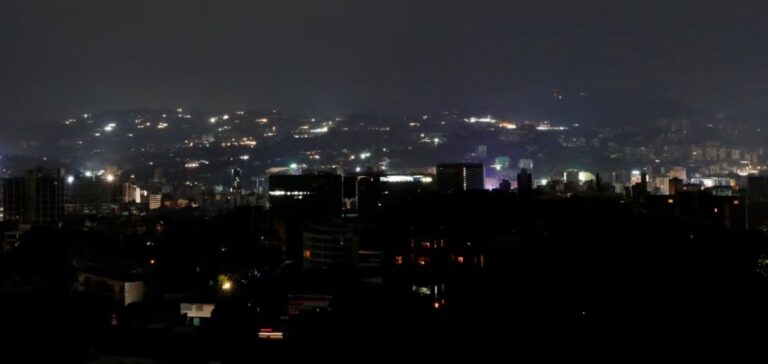Venezuela is gradually restoring electricity after a widespread blackout lasting more than 12 hours on August 30, 2024.
The blackout affected the whole country, plunging millions of Venezuelans into darkness, after a failure at the Simón Bolívar hydroelectric plant.
Nicolas Maduro and his administration claim that the blackout is the result of “sabotage” by the political opposition, supported by “fascist currents” and organized from the United States. This event takes place in a tense climate, as the opposition continues to contest the legitimacy of Maduro’s re-election on July 28. In a televised statement, Maduro described the act as an attack “full of vengeance and hatred”.
His Minister of Communications, Freddy Nanez, reinforces this rhetoric by referring to the cost of recovering the power grid in 2019, a year marked by a five-day blackout.
However, these accusations of sabotage are not backed up by concrete evidence, nor do they provide details of the exact extent of the damage or the areas affected.
Official statements give way to more technical analyses of the situation.
Failure at the Simón Bolívar power plant and regional consequences
The blackout began at the Simón Bolívar hydroelectric plant in the state of Bolívar, the country’s largest and main source of electricity production.
The incident brought the power grid to an immediate halt, affecting both major cities such as Caracas and more isolated regions.
While electricity gradually returned to the capital and other areas by Friday evening, states such as Mérida, Táchira, Zulia and Lara continued to suffer from unstable and intermittent power supplies.
In towns such as Michelena, in the state of Táchira, residents report that power returned temporarily before leaving again, illustrating the precariousness of the recovery.
Internet connectivity, measured by the NGO VE Sin Filtro, reached just 92.7% on Saturday morning, underlining that the return to normal is not yet complete.
Meanwhile, the Caracas metro service has been restored, but disruptions persist in other public and commercial infrastructures, affecting daily life and economic activity in the country.
Businesses and small operations depend on backup generators, whose installation and maintenance represent additional costs in an already strained economic context.
Energy Experts: Between Technical Failure and Underinvestment
Experts in the energy sector offer a different perspective from that of the government on the causes of the blackout.
Jose Aguilar, a power grid expert, argues that the blackout was probably due to a technical “failure” that would not have had such a widespread impact in a more robust, well-maintained system.
He points out that the “precariousness of the Venezuelan electrical system is such that one thing leads to another”, suggesting a domino effect caused by the absence of preventive measures and maintenance.
Victor Poleo, former Vice-Minister of Electrical Energy, argues that the incident could be linked to an “atmospheric discharge”, aggravated by inadequate and obsolete protection systems.
He criticizes the lack of maintenance and the delay in replacing critical equipment, pointing to years of mismanagement and underfunding in the energy sector.
This analysis highlights the structural challenges Venezuela faces in modernizing and stabilizing its power grid.
The Economic and Political Repercussions of the Black-Out
The impact of the blackout extends far beyond the technical, affecting the country’s economic and political landscape.
In the hardest-hit regions such as Mérida and Zulia, where temperatures frequently reach 40 degrees Celsius, the prolonged blackouts bring additional challenges, such as limited access to drinking water and the need to resort to improvised means of cooling.
Local testimonies, such as that of Nairelis Ramirez in Los Puertos de Altagracia, underline the growing uncertainty and frustration of citizens faced with these repeated blackouts.
The situation comes against a backdrop of post-electoral crisis, with the opposition still claiming victory in July’s presidential elections.
The government’s repeated use of the rhetoric of sabotage and foreign intervention serves to mobilize its political base, but it also masks systemic problems of energy management and infrastructure.
These sabotage narratives, while frequent, do not address the deeper concerns of economic and industrial players about the need for comprehensive reform of the energy sector.
Urgent Need for Reform and Strategic Investment
The vulnerability of Venezuela’s electricity infrastructure calls for a reassessment of energy policy priorities.
For industry professionals, it is essential to invest in network modernization, improve risk management and strengthen resilience against potential failures.
However, international sanctions, combined with the difficult domestic economic situation, pose significant obstacles to the implementation of such initiatives.
There is a growing need for a more rigorous and structured approach to power system management.
The confidence of investors and trading partners in Venezuela’s energy stability depends on these changes.
The country is at a crossroads where decisions taken today will have a lasting impact on its economic and energy future.






















